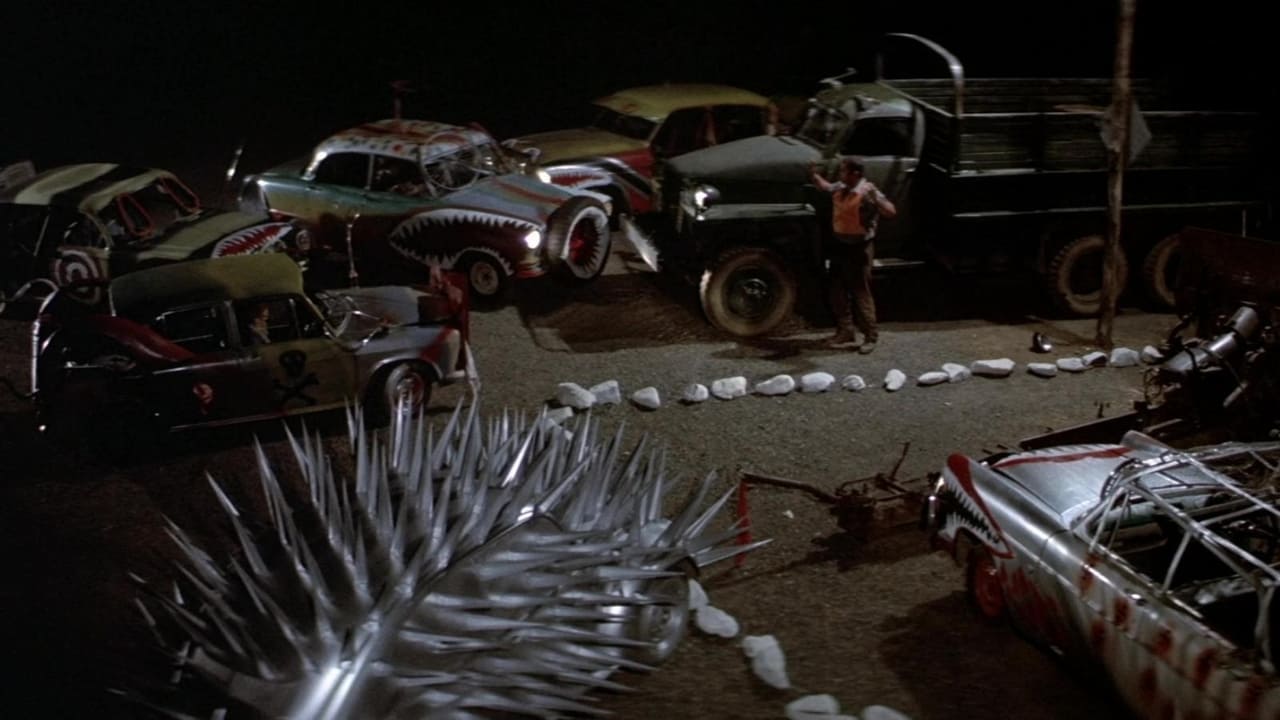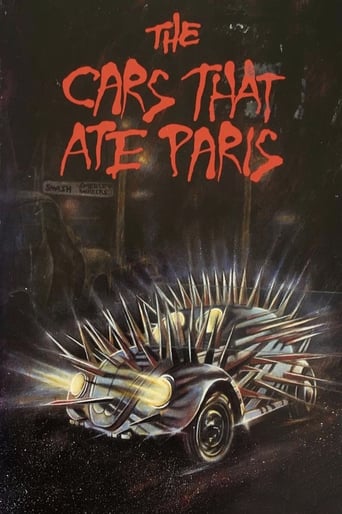



Good start, but then it gets ruined
Good idea lost in the noise
brilliant actors, brilliant editing
Exactly the movie you think it is, but not the movie you want it to be.
View More"The Cars That Ate Paris" is delightfully shocking in a way that still resonates today. I say delightfully because there is every indication in the subtext of the film that what we're watching is a biting, hilarious satire. It works as a satire because of the naturalness of the actors. It doesn't work so well to caricaturize personalities in film as much as it does in literature because caricaturization loses its shock and becomes simply a cause for unbelieving laughter. Instead, satire works better in film when the personalities of the characters are as honest as can be against the backdrop of outrageous circumstances. I'm sure I could think of exceptions, like Dr. Strangelove for example, which needs the caricaturization I think because its plot deals with the mechanisms of government and war. When the scale is that large, caricaturization works. But "The Cars That Ate Paris" doesn't have such lofty targets. It deals with the ordinary people in the world who are easily swept into the agendas of others, sometimes by their own mindlessness. Speaking again for the naturalness of the actors, the "ordinary people" in this film all seem like real citizens of a dusty, scavenger town with delusions of order and efficiency. I was particularly stunned by John Meillon who plays the mayor of the dusty, scavenger town called Paris, Australia. His performance is so seamless, so richly mixed between an authoritative assurance and a desperation to hide from the truth, that he is frightening, frightening in what seems to be his complete lack of introspection or morality. And there doesn't seem to be the need for either in Paris. His character, while in control of most of the goings-on in the town, doesn't seem to need to order anyone around. It's as if they accepted him and his authority as a matter of practicality, as if it were unfathomable to do otherwise. He therefore carries an almost metaphysical command over the actions (and even appearances of) the other characters in the film. It's a hefty role to take on and make real, but John Meillon succeeds marvelously. It's one of the great bad guy performances that isn't really a bad guy performance. As an audience member you just feel the entropy and instability vibrating behind the eyes of Meillon. Aside from the natural acting, the film succeeds because of Peter Weir's vision, which finds its greatest catalyst in the "wild west," sepia toned cinematography by John McLean. The camera is focus more on the faces of the actors than anything, and anytime it steps out into the dirt roads of Paris, it exposes hardly anything other than the commotion and impenetrability of the town. It's a skillful early work from Weir who would later succeed again in satirizing authority and control over the events of life with The Truman Show in 1997. The only thing that wasn't all that awesome was the performance by Terry Camilleri as Arthur, the man who comes to live in Paris by accident. It seems like he was uncomfortable as an actor, almost unable to get into his character's shoes. However, it doesn't ruin the film when Meillon's performance is so intoxicating.
View MoreA movie done in style, all about relations between people, not normal people but where everyone is insane to varying degrees. These insane people try to create a town whose purpose, whilst fulfilling the normal needs is done in an insane fashion. They trap passing motorists at night and run them off the road. Should they survive they handed over to a macabre doctor who lobotomises them with a power tool to become his, experiments. There cars are stripped of any valuables than burned. Any equally disturbed individuals are recognised and kept to become a part of the insane community. To be best enjoyed as art background when suitably intoxicated and quietly partying. A movie clearly done to be enjoyed in this style, as it drifts from sane to insane in the same activity, as moments drift from sense to senseless. A movie that keeps you hanging on the edge of having a plot, of accelerating the story, of having real meaning only to leave you drifting along with it.
View MoreThis is my all-time favorite movie. It might seem a pretty strange film at a distance of 30 years; perhaps you had to be living in Australia in 1972 to appreciate it. Peter Weir made 'The Cars That Ate Paris' about the same time as 'Picnic at Hanging Rock' (which was much more successful at the box office and won a lot more critical acclaim). One top film critic at the time commented that 'Picnic' with all its ethereal mystery was Weir's take on sci-fi movies, while 'Cars' was an allegory of the vampire movie. Vampire films are meant to be gory and crass with low-budget special effects; so is 'Cars'. It resonates perfectly with the 1970's Australian shock-horror tabloid culture about road accidents, violence, bikie gangs, rebellion, drugs and guilty pleasures. The understated menace of the small-town violence is brilliant, a precursor of modern Australian horror films like 'Wolf Creek'. The pathetic impotence of the older generation is also a classic 1970's theme. The intentionally low budget production style is another hallmark of Australian creativity. To me this film encapsulates and satirises everything that happened in 1970's Australia, and I cherish it.
View MoreThis truly odd and eccentric black comedy is especially worth checking out in order to notice how drastically Peter Weir's filming style changed from dared and out-of-the-ordinary cult in the 1970's to dull and politically correct rubbish in the 1980's, 1990's and 2000's. No matter how popular and acclaimed films like "Dead Poets Society", "Master & Commander" and "The Truman Show" are, they're blunt compared to the uniqueness and virility of "The Cars that Ate Paris". At least this film doesn't feature tiresome morality speeches and here the dialogues are, in fact, surprisingly controversial most of the time. For example; when explaining to total strangers that you accidentally killed a old man by accidentally running your car over him, do you expect them to reply with: "Yeah, those old pedestrians are a real problem, aren't they?" Welcome to Paris; a remote little outback Australian town where the people go to church, love their families and where the economy entirely thrives on one thing: car crashes! The whole town assists in deliberately causing accidents and then use the parts and accessories as currency to buy stuff in the shops. The outsiders from the accidents either end up in the graveyard, as medical guinea pigs in the local hospital or as in protagonist Arthur Waldo's case as brand new residents of Paris and close friends to the mayor. It's truly close to brilliant how Peter Weir manages to sustain the friendly and nonthreatening tone throughout the whole movie. All members of the community are basically insane psychopaths, yet you symphatize with them a lot more because the "hero" (Arthur) is such an antipathetic loser and the young generation (that eventually revolts against the town's ancient habits) are boisterous and uncanny freaks. Even the mayor, who's really the evil mastermind, is portrayed like a jolly figure with whom you'd love to chat. I know that most people wish to forget their viewing of "The Cars that Ate Paris" because it moves slow and looks dark, but the basic premise really is one of the best horror ideas ever coming from Australian cinema. And that WV Beetle covered in spikes is a highly memorable piece of scenery!
View More